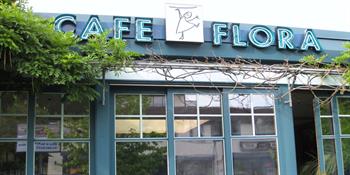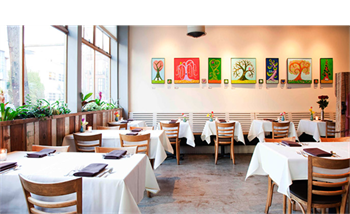In September of 2008, Nat Stratton-Clarke had already been working as the Café Flora’s general manager for two years when he took over its ownership. A month into owning a restaurant for the first time, the economy shifted and he found himself fighting to keep the vibrant, daylight-filled Madison Valley hot-spot afloat.
Over ten years later, Café Flora survived the recession and remains as one of the oldest vegetarian restaurants in the country. Celebrated for its locally-sourced menu, full bar, and bustling weekend brunch, the café is also the workplace of several employees who’ve remained on staff ever since Nat took over as owner.
 “For me, what we do here is about serving great food which happens to be vegetarian or vegan,” said Nat. “It’s such a great sign when a [non-vegetarian] person leaves and they loved everything they had, they’re full, and then they might end up being some of our biggest fans – because they’re like, ‘Wait a minute – I never knew I could eat a meal without meat that’s delicious, filling, looks beautiful, and tasted great.’ I would say, the majority of our guests are not vegetarian. They’re just people who love our food.”
“For me, what we do here is about serving great food which happens to be vegetarian or vegan,” said Nat. “It’s such a great sign when a [non-vegetarian] person leaves and they loved everything they had, they’re full, and then they might end up being some of our biggest fans – because they’re like, ‘Wait a minute – I never knew I could eat a meal without meat that’s delicious, filling, looks beautiful, and tasted great.’ I would say, the majority of our guests are not vegetarian. They’re just people who love our food.”
For 29 years, Café Flora has stocked its kitchen with produce from local, small organic farms and other small businesses. Currently, the café fills its menu by working with 18 different farms year-round. Its bar features craft beer and wines from across Washington and Oregon, as well as spirits from regional small-batch distilleries.
Nat supported himself through college by peeling potatoes and washing dishes, but he had his eyes set on a legal career in social justice. As he got closer to applying to law school, he realized how a career in the kitchen could be equally as impactful, by connecting communities through food and leading by example.
“One of the reasons why I do what I do is to not only help Café Flora, but to also talk to other restaurant owners and businesses about what it means to create a safe work environment for everyone to come to work and do their job, but also feel safe, and like they can bring their whole selves to work,” said Nat.
As an openly transgender man, Nat’s personal experiences have allowed him unique insight to build a safer and more affirming space for both his employees and customers. “As somebody who’s white and presents as male, I have a lot of privilege in that. I choose to share my story, but that doesn’t mean that other people have to. It’s not necessarily safe for everyone,” he said. “Because I employ myself, nobody can fire me for being trans. If somebody doesn’t want to eat here because I’m trans, fine. Then don’t. If you have a problem with one of my employees and their pronouns or gender-presentation, that’s okay. But I’m going to stand behind my staff 100 percent. I’m going to protect their ability to come to work as their authentic selves every day, because so many trans people don’t get that and don’t feel comfortable or safe at work.”
Employees of Café Flora always have their pronouns listed next to their names on staff lists. The café’s employment application also has a section for prospective employees to list their preferred name next to their legal one, so new team-members are referred to by their authentic names starting on their first day on the job, and the cafe’s dress code is not gender-specific.
“As a business owner, it’s your job to create a supportive work environment for everyone. There’s a lot business owners can do to create (inclusive policies) so their employees who have marginalized identities don’t have to do that work of educating people,” said Nat.
With having a diverse workplace, Nat also speaks with his managers about the personal questions employees might tend to ask each other about their identities, including gender. He empowers his managers to walk employees through sensitive questions employees might have, rather than leave it to coworkers to educate each other about their own identities, and in turn, feel obligated to divulge personal details.
Nat chooses to be out because he believes being visible as a successful entrepreneur who’s trans, will not only help empower his employees who identify as transgender or gender-diverse, but open doors to conversations about the nuances of identity and privilege in business.
“There a lot of little things that people often wouldn’t think of. Like applying for a business loan, it will pull your entire credit history and every name change you’ve ever had,” said Nat. “So I’ve been in a bank, looking for a loan, and somebody’s pulling up my credit history and saying, ‘This is so strange, do you have a sister?’ So I’m having to sit in a bank branch and come out to somebody, which has nothing to do with how I run business.”

Even though Nat chooses to be out as trans, his expertise still lies within the service industry, not the nuances of gender-identity. “Sometimes, I’ll be in a conversation with someone about something totally food-related, and then they shift gears and want to talk about me being trans,” he said. “I’m only an expert on my personal experience – that’s all I can speak to. I’m not going to go around and do trans-sensitivity trainings. Some of the best trainings I’ve had have been led by people who aren’t trans and there are so many great trainings here in Seattle people can use.”
Currently, Nat is focused on what he does best: food. With the changing season, he’s excited for a change-up in Café Flora’s menu. “Right now, it’s exciting to start to see nettles, fiddlehead ferns, asparagus, and rhubarb. I love a root vegetable just as much as the next person, but it’s nice to have that transition into spring,” he said. “We’re lucky to live in a region that has some of the best produce in the world.”
Ingersoll Gender Center offers a variety of comprehensive trainings employers can utilize to better understand trans and gender-diverse identity and how to implement inclusive practices. Including GSBA and Ingersoll Gender Center, eight local organizations have come together to form the Transgender Economic Empowerment Coalition (TEEC), a group working to survey and address systematic disparities among trans and gender-diverse people living and working in King County. The TEEC currently has two active surveys to help guide their scope of practice, including a survey for employers about trans-inclusive policies and a survey for trans and gender-diverse people living in King County about their experiences.



